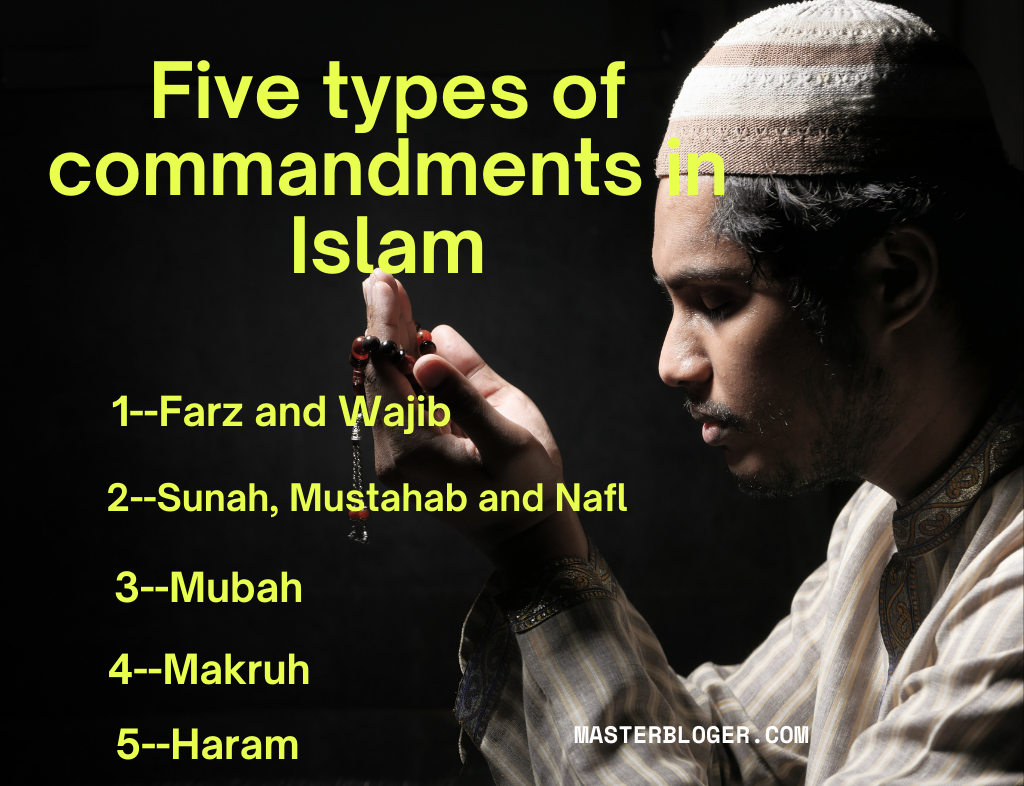Table of Contents
five Commandments in Islam
Five commandments mean the five basic principles ordered by Allah Al Mighty to be followed by the Muslims, and by following these rules they will also be rewarded and sometimes punished if not followed.
These five commandments are as follows:
1. Farz and Wajib
Farz, the word meaning that is compulsory, and it means one’s duty, meaning the actions you perform, you will be awarded for that, but when you leave it or do not perform that, you will be punished as well. It means that refusing to do those actions is sinful, OR simply we can say that religious duty in Islam is mandatory by Allah.
For example, Namaz is placed under the category of Farz. By performing it we will be awarded many prizes by the almighty Allah the biggest one is Jannah. And by not performing it we will be punished. Similarly, paying zakat, having the capability of performing Haj, and keeping the Fast in the month of Ramadan all come under the category of Farz. And same is the case with Waajib which the actions being obligatory to perform and by not performing must be sinful. For example Prayers of Wajib in Isha Namaz . These obligations are part of the five commandments.
2. Sunah, Mustahab and Nafl (Recommended)
Sunah are the actions performed by our Prophet (SAW) from the interpretations of the Quran. Simply means the way of the Prophet. Mustahab refers to the actions or duties recommended but not essential. Nafl refers to an optional act.
These are the actions which by performing or fulfilling you will awarded but by not performing these actions one will not be punished. They are encouraged within the five commandments framework.
3. Mubah (Permissible)
Mubah is an Arabic word that means permitted or we can say that JAIZ. It has a technical use in Islamic laws. These actions fall in the category that by performing there is no reward and by not performing you will not be punished also. This permissibility falls under the five commandments.
4. Makruh (Disliked)
Makruh means detestable or abominable. Something which is disliked or offensive act. It is one of the five commandments categories of Islam. Though a Makruh act is not Haram (forbidden) in Islam you will be subjected to punishment but by not performing these actions you will be rewarded. Muslims are encouraged to avoid these actions. An example is the use of large amounts of water
5. Haram (Prohibited)
As the name indicates these are the actions that are completely forbidden by Islam. The actions are sinful and by performing these actions you will be punished and by not performing you will be awarded. These are the five commandments by Allah almighty to be followed and to be rewarded by Allah Almighty.
These are the five commandments by Allah Almighty to be followed and to be rewarded by Allah Almighty.
Related Articles:
- Master Your Business Success: My Business Plan & General Overview Explained
- 4 types of skills : technical skills vs Communication skills
- Aspects of Novel | Plot, Character, Setting
- 10 Proven Tips on How to Improve Your Study Habits for Success
- 13 Essential Punctuation Marks You Must Know: Mastering Grammar and Writing Skills!
